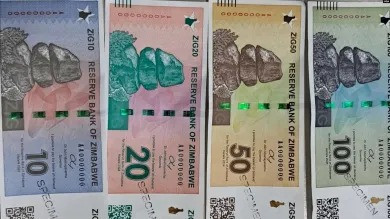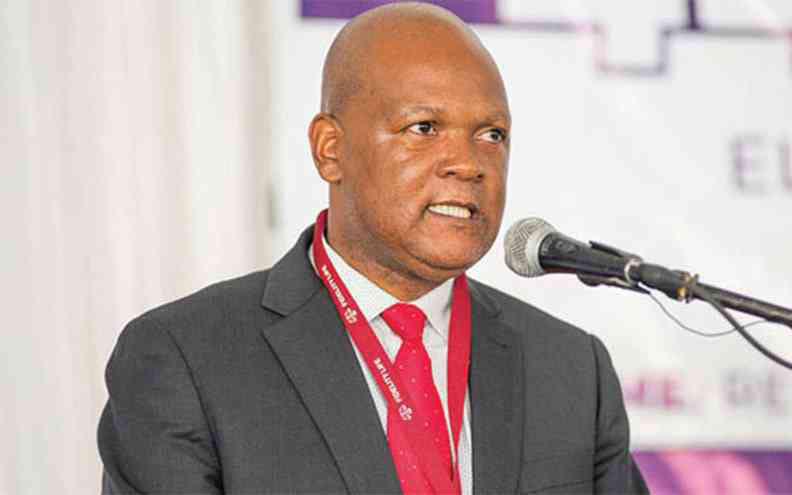
BETWEEN 2009 and 2024, Zimbabwe has changed its rapidly declining currency six times, underlining structural failures by monetary and fiscal authorities to maintain the local unit's stability.
The central bank discarded the Zimbabwe dollar (ZWL) in April and replaced it with Zimbabwe Gold (ZiG), which it says is anchored by foreign currency and gold reserves, and other minerals.
Before the ZWL was abandoned, it had lost 70% of its value against the greenback between January and April.
Informal traders and some retail outlets are only accepting payments in the US dollar, while government is offering some of its services exclusively in foreign currency.
The pessimism largely stems from lingering memories of how Zimbabweans’ savings were wiped out by barrelling inflation in 2008.
Broadly, the cause of Zimbabwe’s hyperinflation is largely attributed to disastrous structural economic reforms the late former president Robert Mugabe’s administration implemented in the early 1990s, the chaotic land reform programme of 2000 and the country’s costly intervention in the Democratic Republic of Congo (DRC) war of 1998.
During those turbulent years when Zimbabwe reeled under Western imposed sanctions, Gideon Gono presided over the central bank, which engaged in quasi-fiscal activities to prop up Mugabe’s cash-strapped government.
At that time, as the Zimbabwean currency rapidly lost value against the greenback, Zimbabwe’s desperate authorities resorted to imposing price controls, which triggered an acute shortage of basic commodities.
- Letter from America: The death of the Zimbabwe dollar shows the King has no clothes
- Winky D dominates Trevor’s In Conversation
- Letter from America: The death of the Zimbabwe dollar shows the King has no clothes
- Winky D dominates Trevor’s In Conversation
Keep Reading
On many instances, Mugabe railed against retailers, the opposition and the West among other perceived saboteurs ‘conspiring to decimate Zimbabwe’s currency’.
In an effort to salvage the collapsing currency, the Reserve Bank of Zimbabwe (RBZ) ramped up the money printing press, reconfigured its notes and disregarded updating spiking exchange rates among other tactics without tackling the underlying causes of runaway inflation. As inflation rampaged, Zimbabwe in 2008 introduced a one hundred trillion dollar note.
Over the intervening years, the RBZ continued on the same trajectory, excessively printing money to fund government’s capital projects, thereby fuelling broad money supply. In economic terms, a country experiences excess money supply when the amount of money in circulation exceeds its economy’s output.
At its inception, the new unit was pegged at a fixed exchange rate of US$1:ZiG13,56 but has plummeted to ZiG20 on the black market.
Amid the depreciating ZiG currency, the apex bank and Treasury have resorted to command style tactics including a crackdown on “illegal” money traders to maintain the unit’s stability.
Such heavy-handed tactics, whose efficacy in the face of a fragile currency has been questioned by economic experts, have netted hordes of suspected money traders allegedly engaging in speculative activities to the detriment of the unit.
Economist Stevenson Dhlamini contends that acceptance of ZiG cannot be foisted on the public and business sector without adopting sweeping structural reforms.
“Enforcing such through the legal route is not the optimal route to ensure the acceptance of ZiG. The structural reforms are in place. Fuel can now be bought using ZiG,” he said.
“These are part of the measures that give confidence to the market. Publication of the money supply statistics by the RBZ and ensuring that there is transparency and accountability also goes a long way in fostering market confidence.
“Other structural reforms that can be initiated include a higher adoption of the use of the ZiG by state-owned enterprises. Prices offered by these parastatals must be denominated in ZiG.
“This will go a long way in ensuring that there is confidence in the market. More of institutional quality reforms are needed,” Dhlamini said.
Following the launch of the new unit, the government also announced that it would push for legislation to blacklist illegal foreign currency trading as money laundering.
Economist Vince Musewe noted that the command approach employed by government to promote acceptance of the local unit was not sustainable.
“It is sad when citizens are expected to accept a currency. It indicates that policymakers are not taking into account the social impact of what they prescribe. It is not sustainable at all. Full dollarisation is the only sustainable solution at this rate.”
RBZ chief John Mushayavanhu told a Zimbabwe Independent breakfast meeting in Bulawayo last month that there was a need to build confidence and trust in ZiG.
“I think in the leaked memo that I sent to central bank staff, I also raised this issue. I said the market has lost confidence in us. It is us who must rebuild that confidence,” he said.
“The way we build that confidence is by walking the talk. You cannot, as I said, legislate for confidence. It is not possible. Even if you go around beating up people, they will still not be confident, unless you walk the talk.”
While Bulawayo mayor David Coltart reinforced this point when he offered a compelling analogy in his opening remarks, likening the confidence in ZiG to selecting an airline for travel.
“As we consider any currency of any country, what is the useful analogy to judge it by. I think the best analogy is to compare a currency to airlines,” he said at the breakfast meeting three weeks ago.
“What is it about an airline, which encourages passengers to use that airline. Passengers will consider… what is its track record. Confidence in the fleet of the airline isn’t simply built by an airline being new….Confidence does not simply rely on the introduction of a new aircraft.
“The point I am making is that there are comparisons to be made between the confidence that resides in any airline and the confidence in any currency in any country. It comes down to a single word: Trust.
“The trust is not built overnight, it is something that takes years and decades to build in an airline. It cannot be imposed. It is something inherent. If you seek to impose trust, it will not work. Passengers will use another airline or bus or they may even walk.
“The same applies to a currency. We need a domestic currency, no rational person denies that, but there has to be trust and it is not built overnight and it cannot be imposed,” Coltart added.
With the ZiG currency now in circulation, its stability can only be maintained if authorities curtail unrestrained money printing and abandon quasi-fiscal activities, among other measures.
The country is watching to see if Mushayavanhu keeps his word that he will not engage in quasi-fiscal activities.
“I do not believe in quasi-fiscal activities. It is not going to happen under my watch. My mandate as spelt out in the Reserve Bank Act is very clear and I have no intention to do other people’s jobs. I will do my job as the central bank governor as defined in the RBZ Act,” he said on April 5.










